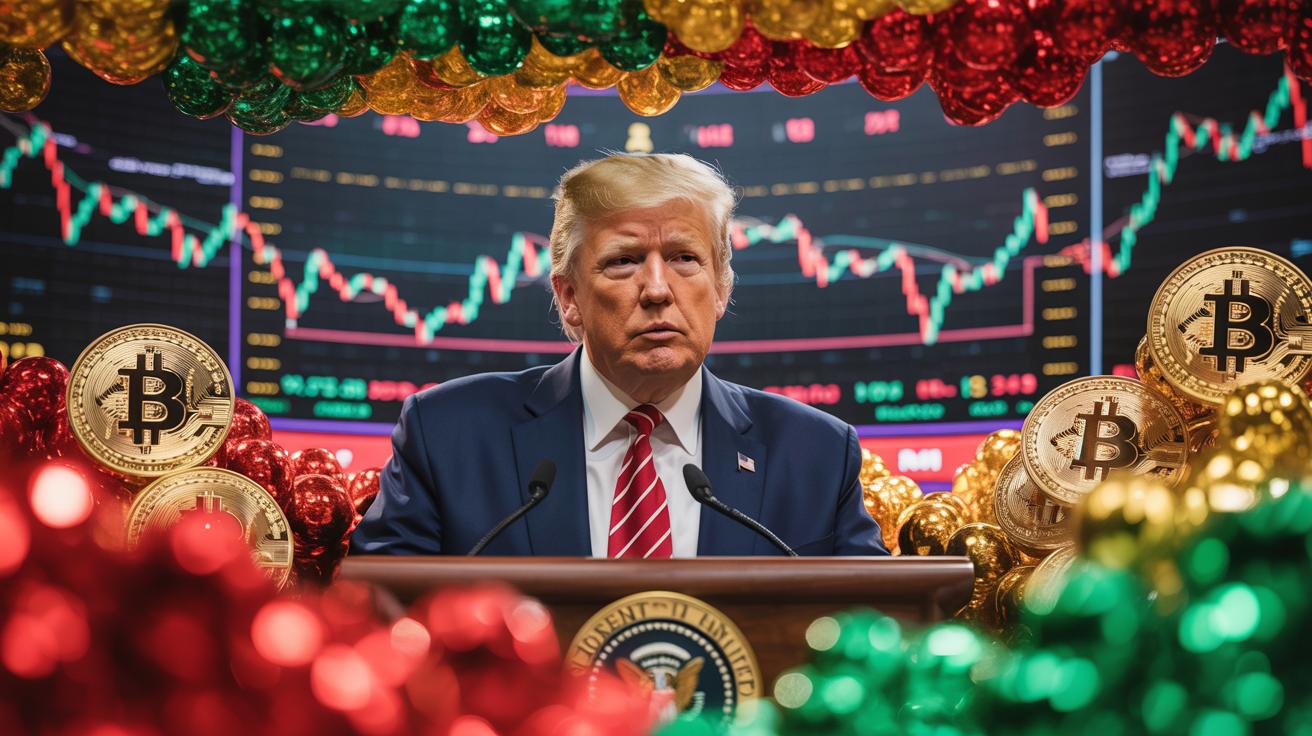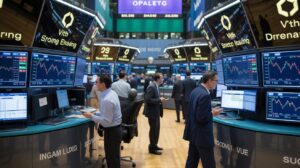What You Need to Know
- 🚀 President Donald Trump announced a 50% tariff on Brazilian imports, citing unfair trade practices and political tensions.
- 📉 The U.S. stock futures dipped slightly, with S&P 500 and Nasdaq-100 futures trading 0.2% lower as investors reacted to the tariff news.
- 💡 Despite trade tensions, the tech sector remains robust, highlighted by Nvidia’s performance, which briefly pushed its valuation to $4 trillion.
- 💰 Bitcoin surged to a new record of $112,052.24, reflecting increased institutional interest and favorable market conditions.
- 🔍 The geopolitical landscape remains volatile, prompting questions about the implications of these economic strategies on global trade dynamics.
In a rapidly evolving global market, the dynamics between major economies have never been more crucial. Recent moves by the United States under President Donald Trump have sent shockwaves through the international trade landscape. With the announcement of a 50% tariff on Brazilian imports, a new chapter unfolds in the complex narrative of U.S.-Brazil trade relations. As this development unfolds, it raises pertinent questions about economic strategies, market reactions, and the possible implications for international diplomacy.
Trump’s Bold Tariff Decision
President Trump’s recent decision to impose a 50% tariff on Brazilian imports has stirred significant controversy and speculation. This move is partially in response to the ongoing trial against former Brazilian President Jair Bolsonaro, accused of attempting to overturn the 2022 election results. Trump labeled the trial a “Witch Hunt,” demanding an end to what he perceives as an injustice. In an open letter, Trump criticized Brazil’s trade practices as “very unfair,” prompting the U.S. to investigate Brazil’s economic dealings.
By levying such a high tariff, the U.S. aims to address perceived imbalances in trade relations while exerting political pressure. This bold stance reflects Trump’s broader economic strategy, which often prioritizes domestic interests and aims to renegotiate trade terms to favor American industries. As the August 1 implementation date approaches, businesses and policymakers closely monitor the potential ripple effects on the global market and diplomatic ties.
Impact on Financial Markets
The U.S. tariff announcement has already begun to affect financial markets. Stock futures experienced a decline, with S&P 500 and Nasdaq-100 futures trading 0.2% lower. The Dow Jones Industrial Average futures also dipped by 100 points, indicating investor anxiety. Meanwhile, the iShares MSCI Brazil ETF (EWZ) saw a premarket drop of 1.8%, highlighting concerns about the Brazilian economy’s resilience.
Despite these challenges, optimism around the artificial intelligence sector buoyed U.S. markets during the same period. Notably, the Nvidia-led rally helped the Nasdaq Composite close at a record high, with Nvidia shares briefly reaching a $4 trillion market valuation. This juxtaposition underscores the complex interplay between geopolitical developments and technological advancements in shaping market dynamics.
AI and the Bull Market
The growing influence of artificial intelligence in the financial sector cannot be overstated. Recent gains in the tech industry, driven by AI innovations, have significantly impacted market trends. Nvidia’s remarkable performance is a testament to the sector’s potential to drive economic growth and investor confidence. The S&P 500’s information technology sector reached new heights, underscoring the pivotal role of AI in sustaining the current bull market.
Experts like Jeremy Siegel from the Wharton School suggest that AI could counteract potential price increases resulting from tariffs. As AI technologies continue to evolve, their capacity to enhance productivity and efficiency across industries may offset some of the economic challenges posed by international trade disputes. This potential for innovation-driven growth prompts questions about the long-term sustainability of the current market rally.
Bitcoin’s Record-Breaking Surge
Amidst the tumultuous trade environment, Bitcoin has emerged as a surprising benefactor, reaching a new high of $112,052.24. This surge coincided with Nvidia’s stock performance, highlighting the interconnectedness of technology and cryptocurrency markets. Bitcoin’s resilience reflects growing institutional interest and favorable regulatory conditions, which have bolstered its legitimacy.
Chris Kline, cofounder of BitcoinIRA, attributes this rise to a “perfect storm” of market conditions, including speculation about Federal Reserve Chair Jerome Powell’s future and potential interest rate cuts. As Bitcoin continues to break records, its role as a digital asset and hedge against economic uncertainty becomes increasingly prominent. Investors and analysts alike ponder the implications of cryptocurrency’s ascent on traditional financial systems.
As geopolitical tensions and economic strategies continue to influence global markets, the world watches with bated breath. The U.S.-Brazil tariff situation, coupled with technological advancements, highlights the intricate balance between political decisions and economic realities. In this dynamic landscape, one key question remains: How will nations navigate these complexities to foster sustainable growth and diplomatic harmony?
Did you like it?4.5/5 (29)





10 comments
Whiskey
Yikes! 50% tariff sounds massive. How will small businesses cope with this sudden change?
MorganEssence
Anyone else feeling like they’re living in an economic thriller novel right now?
Eliana
Bolsonaro on trial and now this? Brazil’s having a rough time. Hope they can pull through.
bella
This seems like a risky move. Are there any back-up plans if the tariffs backfire?
SadieWanderlust
Why is the tech sector still doing well despite all this chaos? AI must be the superhero here!
Emma
Wow, Trump is really shaking things up again. Can’t wait to see how this plays out!
LunaIllusion
Is this tariff likely to cause inflation in the US market, or will it mostly affect Brazil?
joshua9
Bitcoin at $112k? That’s mind-blowing! Maybe I should have invested sooner. 😅
sophiewanderlust
Thanks for the update! I wonder how this will impact Brazil’s economy in the long run.
PaisleyMidnight
What does this mean for the price of coffee? Will my morning cup get even more expensive? ☕